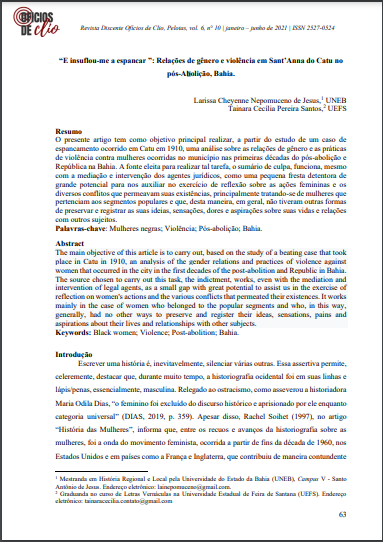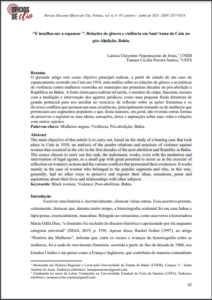Larissa Cheyenne Nepomuceno de Jesus, UNEB
Tainara Cecília Pereira Santos, UEFS
Resumo
O presente artigo tem como objetivo principal realizar, a partir do estudo de um caso de espancamento ocorrido em Catu em 1910, uma análise sobre as relações de gênero e as práticas de violência contra mulheres ocorridas no município nas primeiras décadas do pós-abolição e República na Bahia. A fonte eleita para realizar tal tarefa, o sumário de culpa, funciona, mesmo com a mediação e intervenção dos agentes jurídicos, como uma pequena fresta detentora de grande potencial para nos auxiliar no exercício de reflexão sobre as ações femininas e os diversos conflitos que permeavam suas existências, principalmente tratando-se de mulheres que pertenciam aos segmentos populares e que, desta maneira, em geral, não tiveram outras formas de preservar e registrar as suas ideias, sensações, dores e aspirações sobre suas vidas e relações com outros sujeitos. Palavras-chave: Mulheres negras; Violência; Pós-abolição; Bahia.
Abstract
The main objective of this article is to carry out, based on the study of a beating case that took place in Catu in 1910, an analysis of the gender relations and practices of violence against women that occurred in the city in the first decades of the post-abolition and Republic in Bahia. The source chosen to carry out this task, the indictment, works, even with the mediation and intervention of legal agents, as a small gap with great potential to assist us in the exercise of reflection on women’s actions and the various conflicts that permeated their existences. It works mainly in the case of women who belonged to the popular segments and who, in this way, generally, had no other ways to preserve and register their ideas, sensations, pains and aspirations about their lives and relationships with other subjects. Keywords: Black women; Violence; Post-abolition; Bahia.


